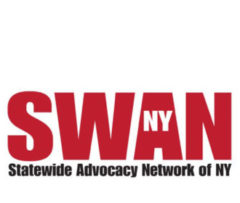CCO/HHs – Memorandum of Concern
SWAN of NYS – Statement of Concern CCOs- PDF
Comments from the State-Wide Advocacy Network of New York State, a coalition of independent family groups focused on services for individuals with Intellectual and Developmental Disabilities.
DDAWNY Family Committee, ENYDA, GROW, NYC FAIR
Executive Summary
As parents, we are attracted by the vision of an integrated network that improves and coordinates the services that our children receive. We would like this network to be effective and responsive, and it is in this spirit that we lay out our concerns about the ambitious agenda for the creation of care management for the IDD population as set forth in the draft RFA. Our hope is to help New York State create and maintain a person-centered system that helps all individuals with IDD live better lives. We understand that for the system to survive in a world of competing budget priorities, it must be able to point to the data-driven evidence of those better lives. Our belief is that to be successful, the system must have these characteristics:
- A fundamental focus on appropriate use of services and supports which result in personalized goals, in contrast to medical model focus on reductions in avoidable use.
- Outcome measurements and Value Based Payments based on that fundamental focus, which therefore
- recognize the wide range of support needs.
- do not penalize individuals with high acuity and their service providers.
- reward CCOs and MCOs for maximizing quality of life, rather than rewarding them for minimizing the overall cost.
- Ongoing structured family involvement in every step of the governance process, from creation of outcome measurements to policy definition, and all the way through to operational oversight.
Concerns: Family Involvement in CCO/HH’s
We hope you share our belief that parent participation will help the transformation process achieve the best possible results. To begin with, the core principal of Comprehensive Care Management is to coordinate services by assembling an interdisciplinary team to develop an individualized plan of care. Other disciplines recognize family advocacy as part of that team. We encourage OWPDD and DOH to examine how a family advocacy role can be developed for the CCO/HH.
We would like to see a role for family advocacy in the governance of the CCOs and MCOs. We recommend a strong ombudsman role and an appeals panel of family advocates.
Concerns: Measures for Value Based Payments (VBP)
The suggested outcome measures do not sufficiently take into account the wide range of support needs. While we want to support and celebrate those individuals who are capable of independent living and competitive employment, we are deeply concerned about the possibility of neglecting the higher acuity portion of the IDD population. Measurements are based on CQL/POMs, or use an increase in the number of individuals employed, the number who have moved into self-direction or more integrated settings outcomes that do not recognize acuity. The recommendations of the DD Subcommittee of the Clinical Advisory Group recognized the limitations of these measures. Applying this paradigm across the wide spectrum of individuals that comprise the I/DD population is not only inappropriate, it encourages service providers to limit the number of higher need individuals that they serve.
Earlier this year SWAN met with Director Helgerson to introduce ourselves and to share our concerns about the system transition to managed care. At that meeting we discussed the need for the development of better outcome measures. We propose that DOH and OPWDD form a work group with SWAN to create a process for working with families to develop these measures. We think a combination of surveys and workshops could be conducted around the state to identify a more comprehensive way to measure the outcomes for our loved ones. This same effort will also serve to educate families about the system transformation.
Concerns: Healthcare Bias in the RFA
The RFA reflects a healthcare bias, the medical model emphasis on preventing avoidable utilization. We recognize the importance of coordination between healthcare services and long term services and supports, and support the goals of reducing hospitalizations, promoting wellness, communication between providers, etc. However, for individuals with IDD that is just the starting point. The big challenge in IDD is the Long Term Services and Supports (LTSS). It is not clear from this RFA how non-medical LTSS will be affected by CCO’s.
As the creation of the CCO/HH’s is intended to be the first step to transitioning I/DD services into Managed Care, we are concerned there will be an effort to reduce rates for all types of services. For example, the current difficulties CDPAS individuals have with maintaining staff are due to Managed Care imposed rate reductions. Individuals using Self Direction with employer authority may be especially affected, but the impact of rate reductions would be felt everywhere.
Concerns: CCO Requirements
As outlined the MSC workforce will require extensive training as a pre-requisite for the job of Care Manager and it is not clear if there is the time or the resources to make that happen. The qualifications of new Care Managers defines a workforce that is not only has more training, but is a much more costly workforce.
Similarly, the IT requirements are considerable. The RFA mentions start-up grants, but there is no mention of how large they will be. We are concerned about whether these IT expectations are truly achievable.
July 24, 2017
